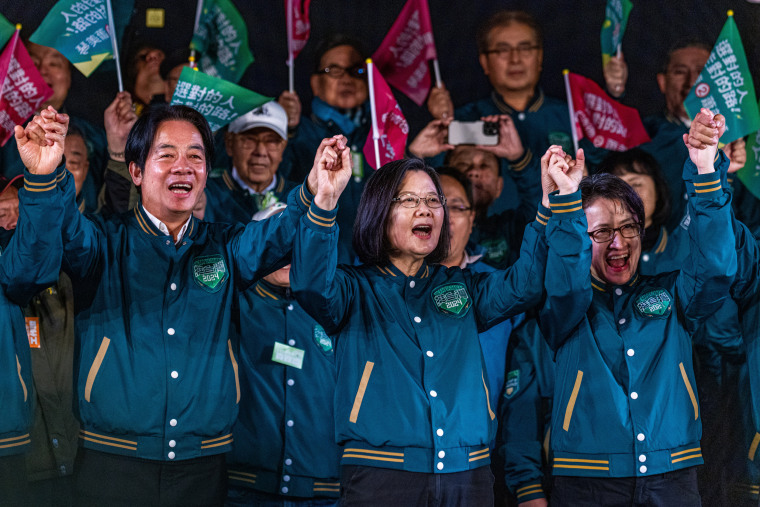[ad_1]
An internet-based propaganda campaign failed to convince voters in Taiwan to pick Beijing’s favorite presidential candidate Saturday, potentially showing the limits of China’s ability to sow discord ahead of the 2024 U.S. election.
Taiwan’s Vice President Lai Ching-te was elected president on Saturday, as voters ignored warnings from Beijing not to support a candidate it has called a separatist and a “troublemaker,” though his party did lose its legislative majority.
Online propagandists targeted voters with falsehoods in the weeks and months ahead of Saturday’s pivotal election, creating scores of fake accounts and promoting a fictional tell-all book slamming Taiwan’s outgoing president. Voters have been inundated with posts from fake social accounts that often disparage Taiwan’s outgoing president and democracy itself, analysts say, two frequent themes pushed by China’s government.
The online influence operation offered a sense of what the U.S. could be in for ahead of its November elections, said Lennon Chang, the acting director of Doublethink Lab, a nonprofit that aims to track and counter Chinese disinformation aimed at Taiwan.
“Taiwan has long been a test field for China in trying out different tactics,” he said. “These might be tactics that they’ll use to manipulate or to disseminate messages.”
It isn’t clear how much of an impact, if any, the propaganda had. Artificial pro-China messaging on social media sites often gets very little engagement online.
Still, China-linked information operations have emerged in recent years as a serious threat. In November, Meta discovered a sprawling pro-China campaign that it described as “the largest known cross-platform covert influence operation in the world,” spanning more than 50 different platforms and websites. That campaign drew little attention or engagement.
In an emailed statement, the spokesperson for China’s embassy in Washington, Liu Pengyu, denied the country was behind any such activity and said that China respects “the current social system of [the] Taiwan region.”
“The so-called ‘China-based online influence campaigns’ is clearly disinformation,” he said.
Taiwan’s election was in part a referendum on its appetite for eventually uniting with China. Outgoing President Tsai Ing-wen, who is term-limited, is a member of the Democratic Progressive Party (DPP), which is more in favor of independence than the Taiwan’s second major party, the Kuomintang.
In December, the social media analytics firm Graphika published a report that found campaigns of fake social media accounts pushing anti-democracy messaging about Taiwan’s elections had started at least as early as May 2022. Those accounts often pretended to be real Taiwanese voters who commented on the news, often in favor of the Kuomintang and critical of the DPP.

Most of the accounts engaged in that behavior had little traction with users and were taken down last year. Still, pro-China information operations have persisted in recent weeks, even using artificial intelligence to create personas that promote the fake book about Tsai, Graphika analyst Libby Lange said in an emailed statement.
The e-book, called “The Secret History of Tsai Ing-wen,” appeared online in recent weeks. Accounts that promoted the book have “used AI-generated avatars in a series of accompanying videos — a sign of how China-linked IO actors are leveraging AI technologies to produce deceptive content,” Lange said.
That book, published anonymously and viewed by NBC News, is hundreds of pages of salacious, unsubstantiated claims about Tsai, often aimed at denigrating her personal life and her family. Videos of people promoting the book have appeared on TikTok and YouTube, though by Friday it appeared the videos had been removed from those platforms.
A Taipei Times investigation of the book found it first surfaced in December on the website Zenodo. The report cited a Taiwanese national security official who claimed that videos about the book, promoted by what they say were AI-created hosts, were initially shared hundreds of times a minute on social media.
Spokespeople from YouTube, TikTok and Meta — all of which are popular in Taiwan — each told NBC News they have taken down fake accounts pushing such propaganda.

A YouTube spokesperson said in an emailed statement that the company was “working around the clock as we approach the Taiwanese elections” and had removed “a significant number of channels for violating our policies.”
As recently as Wednesday, China reiterated its long-standing stance that it would “never compromise” on its position that it has sovereignty over Taiwan and criticized the U.S. for arming the self-ruling democracy. China’s Taiwan Affairs Office this week accused the DPP of potentially triggering “confrontation and conflict” if it retained the presidency.
U.S. President Joe Biden said in 2022 that he would have U.S. troops defend Taiwan if China were to invade it. In a press call with reporters Wednesday, a senior White House official, who agreed to speak on the call under the condition she not be named, said that the U.S. was not formally endorsing a party in Taiwan’s elections but that it opposes any attempt to interfere in them.
“It is no secret, I think, that Beijing has views on the outcome of the election and is trying to shape and course in various different ways,” the official said. “Beijing will be the provocateur should it choose to respond with additional military pressure or coercion.”
[ad_2]
Source link
